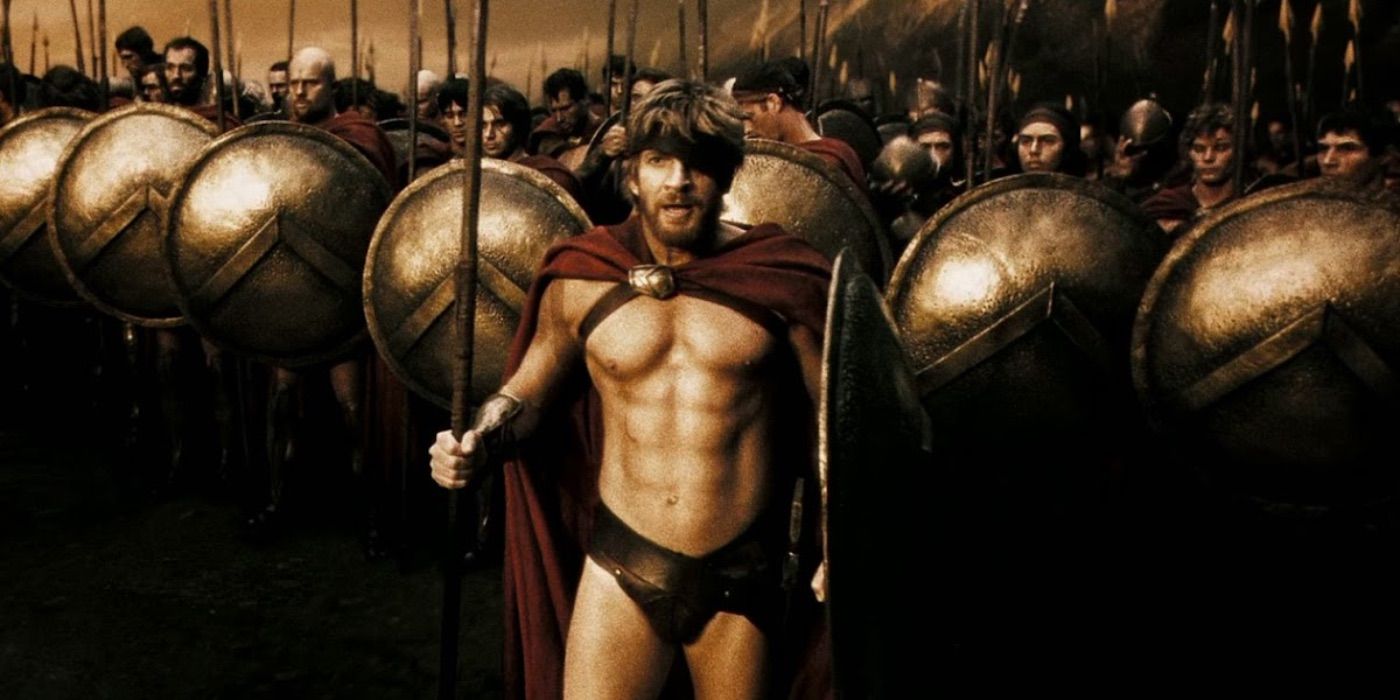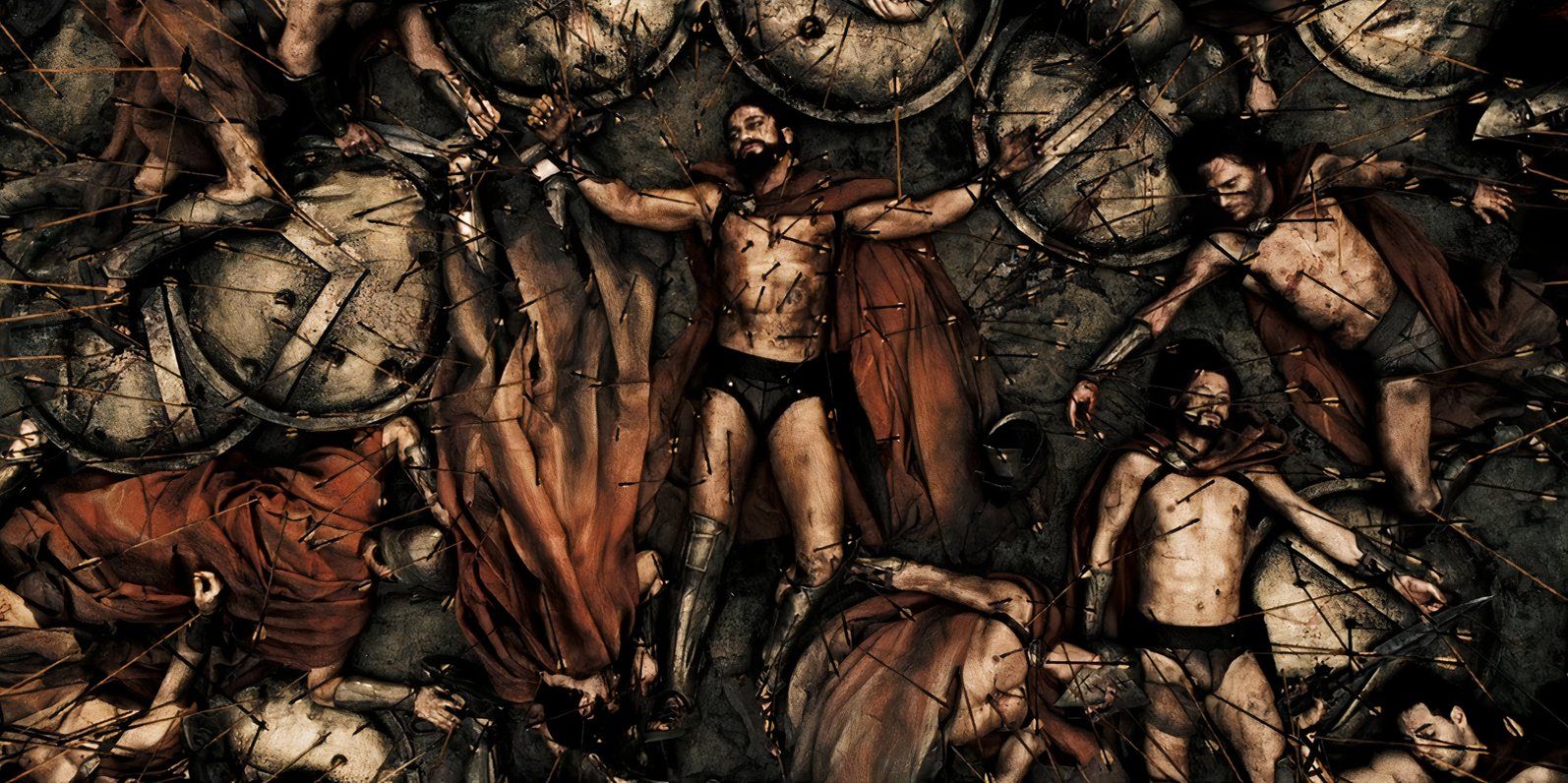Zack Snyder’s historical fiction epic 300 ends in tragic fashion, but it doesn’t answer all the questions viewers might have had. 300 follows the story of King Leonidas (Gerard Butler) as he leads a group of Spartan warriors to defend against the invading Persian army, led by King Xerxes I (Rodrigo Santoro). One of Leonidas’ men, Dilios (David Wenham), narrates the movie and tells the story of the 300 to the world, which inspires the Greeks to fight back against their invaders. While the cast of 300 told that story tremendously well, the movie still left some questions unanswered.
While 300 is mostly known for Snyder’s directorial style and its intense action sequences, it also managed to deliver some important themes and messages. It was often the quiet moments between the movie’s massive fights that helped those messages shine, though the warfare also helped. Still, those messages and themes can be easy to miss among the blood, swords, and shirtless Spartans, so taking a closer look at the ending of 300 can be helpful.
Why Did Leonidas Really Order The 300 To Stay Behind?
Leonidas Sacrificed Himself & His Men For Sparta
The end of 300 sees the death of Leonidas and all of his Spartans, save for Dilios. After Ephialtes betrayed the Greeks and showed the Persians a pass through the mountains, many of the other Greeks chose to flee. They made that decision because the mountain pass took the Persians around the Greek front line and allowed them to encircle their enemy. Even though they faced certain death, the Spartans stayed behind because Leonidas ordered them to, as he said that Spartan law dictated they give no retreat or surrender. Spartan law and the loyalty of Leonidas’ troops, led them to die in battle.
In real life, more than 300 soldiers stayed behind to die at Thermopylae. The 300 Spartans likely had their slaves with them, and several hundred other Greeks from different city states also sacrificed their lives.
In the true story of the Battle of Thermopylae, the reason Leonidas ordered his troops to defend Thermopylae isn’t as clear. Historians aren’t sure if there really was a law in Sparta at the time that forbade troops from retreating, or if they created a law because of the 300’s bravery. Some have even suggested that Leonidas was thinking of the Oracle’s words at the time, and that he had decided to sacrifice himself to save Sparta. A likely explanation seems to be that Leonidas was simply providing a rearguard for the rest of the retreating troops, and that he wanted to prevent the Persian cavalry from running them down.
Why Did Leonidas Tell Ephialtes To Live Forever In 300?
Leonidas’ Final Words To Ephialtes Were Biting Insults
One of the most confusing parts of 300‘s ending was when Leonidas told the traitor Ephialtes “May you live forever.” Despite the seemingly positive nature of his words, Ephialtes looked distraught after hearing them. The reason Leonidas told Ephialtes to live forever was so that he could experience the guilt of his betrayal forever, which was a fate Leonidas considered worse than death. Ephialtes’ actions directly led to the Persians taking Thermopylae and the death of the 300, so Leonidas wanted him to suffer from his sin for as long as possible, something he couldn’t do if he was dead.
Leonidas’ Reason For Not Killing Xerxes I Explained
Leonidas Either Missed His Throw Or Wanted To Prove Xerxes I Wasn’t A God
Leonidas made another shocking decision about his enemies at the end of 300, this time about Xerxes I. In a climactic moment, Leonidas feigned surrender only to pick up his spear and hurl it at the Persian god-king. Even though his deception gave him a great opportunity to kill Xerxes, Leonidas only grazed the King’s cheek, wounding him. In history, this is because Xerxes didn’t die at the Battle of Thermopylae, but in 300 it was either because Leonidas spared Xerxes’ life because he simply missed such a long throw, or because wounding him was enough.
Though the Spartans were defeated, they inflicted massive casualties to the Persians, and though Leonidas missed, he seriously wounded Xerxes.
Dilios spoke at length about how difficult the throw was, which may be an indication that Leonidas simply missed. If that was the case, then Leonidas missing his throw was symbolic of the entire Battle of Thermopylae. Though the Spartans were defeated, they inflicted massive casualties to the Persians, and though Leonidas missed, he seriously wounded Xerxes. Another interpretation could be that Leonidas didn’t miss, and he intended to simply wound the King. Xerxes claimed to be a living god, and by wounding him, Leonidas proved that he bled just like any other man.
Did Dilios Really Spread The News Of Leonidas’ Bravery?
Dilios Was Created For 300, & Didn’t Exist In Real Life
One of the few Spartan survivors of the Battle of Thermopylae in 300 was Dilios, the narrator of the film. In real life, however, he never existed. Dilios was likely based on Aristodemus, a Spartan who had an eye injury and was sent back to Sparta before the fighting began. Aristodemus, however, was considered a coward for not returning to the battle, and he only repaired his reputation by dying courageously at the Battle of Plataea, a year later. While Dilios spread the word of Leonidas’ sacrifice at Thermopylae in 300, in real life, the story became a legend on its own.
What Happened After The Battle Of Thermopylae In 300?
300: Rise Of An Empire Depicts The Aftermath Of Thermopylae
Though Leonidas and the Spartans gave their lives, the Greco-Persian War wasn’t won, and 300 only hinted at what the final outcome was. The final scenes of 300 show Dilios leading a massive army at the Battle of Plataea, which was a resounding Greek victory that allowed the Greeks to end the Persian invasion. By showing Dilios at the Battle of Plataea, 300 indicated that Leonidas was able to inspire countless Greek troops long after his death, and his defeat ultimately led to victory. The Greco-Persian War wouldn’t end until 449 BCE, though, as the Greeks then invaded Persia.
|
Timeline of the Greco-Persian War |
|
|---|---|
|
Event |
Year |
|
Battle of Marathon |
490 BCE |
|
Battle of Thermopylae |
480 BCE |
|
Battle of Artemisium |
480 BCE |
|
Battle of Salamis |
480 BCE |
|
Battle of Plataea |
479 BCE |
|
The Greco-Persian War Ends |
449 BCE |
The final scenes of 300 took place a year after the Battle of Thermopylae, so they didn’t explain how the Greeks were actually able to turn the tide of the war. Luckily, the sequel 300: Rise of an Empire depicts the Battle of Salamis, one of the most important battles in the Greco-Persian War. At Salamis, the Greek fleet was able to decimate the Persian navy, partially due to help from Queen Gorgo and some Spartan ships. 300: Rise of an Empire then makes Leonidas’ posthumous victory even more complete, as his sacrifice allowed the Spartans to assist at Salamis.
The Real Meaning Of 300’s Ending Explained
300 Is A Story About Bravery, Legends, & The Things Worth Fighting For
Though 300 tells a true story, its ending is dripping in symbolism, thematic meaning, and deep messages. 300‘s most prominent message is that bravery, even in the face of certain death, is the stuff of legends. Leonidas and the 300’s courage inspired all of Greece, and it indirectly led to a Greek victory in the Greco-Persian War. It’s also because of their bravery that their names and stories are remembered more than 2,500 years later. When people think of Thermopylae, they don’t think of it as a Persian victory, but rather as a show of Spartan valor, which is the result of their courage.
300 also has some lessons on how great stories become legendary. 300 is not very historically accurate, and it’s not supposed to be. Dilios is an unreliable narrator: he clearly embellishes major parts of the plot, like the monsters in Xerxes’ army, because he wants Leonidas and the 300 to become legends and to inspire other Greeks to fight. Zack Snyder said it himself, “Dilios is a guy who knows how not to wreck a good story with truth,” (via Sci Fi Wire). 300 asserts that the story is just as important as the truth in creating a legend.
For all his talk of better tomorrows and defending Greece against the Persian invaders, the real reason Leonidas sacrificed himself was to keep Gorgo and his child safe.
The final message the ending of 300 tries to convey is that having something worth fighting for is just as important as the fight itself. As Leonidas is taking his last breaths, he speaks and thinks about his wife, Queen Gorgo. For all his talk of better tomorrows and defending Greece against the Persian invaders, the real reason Leonidas sacrificed himself was to keep Gorgo and his child safe. It was because of them that Leonidas had the strength to die at Thermopylae, and 300 makes a point of highlighting that.
Source: Sci Fi Wire


